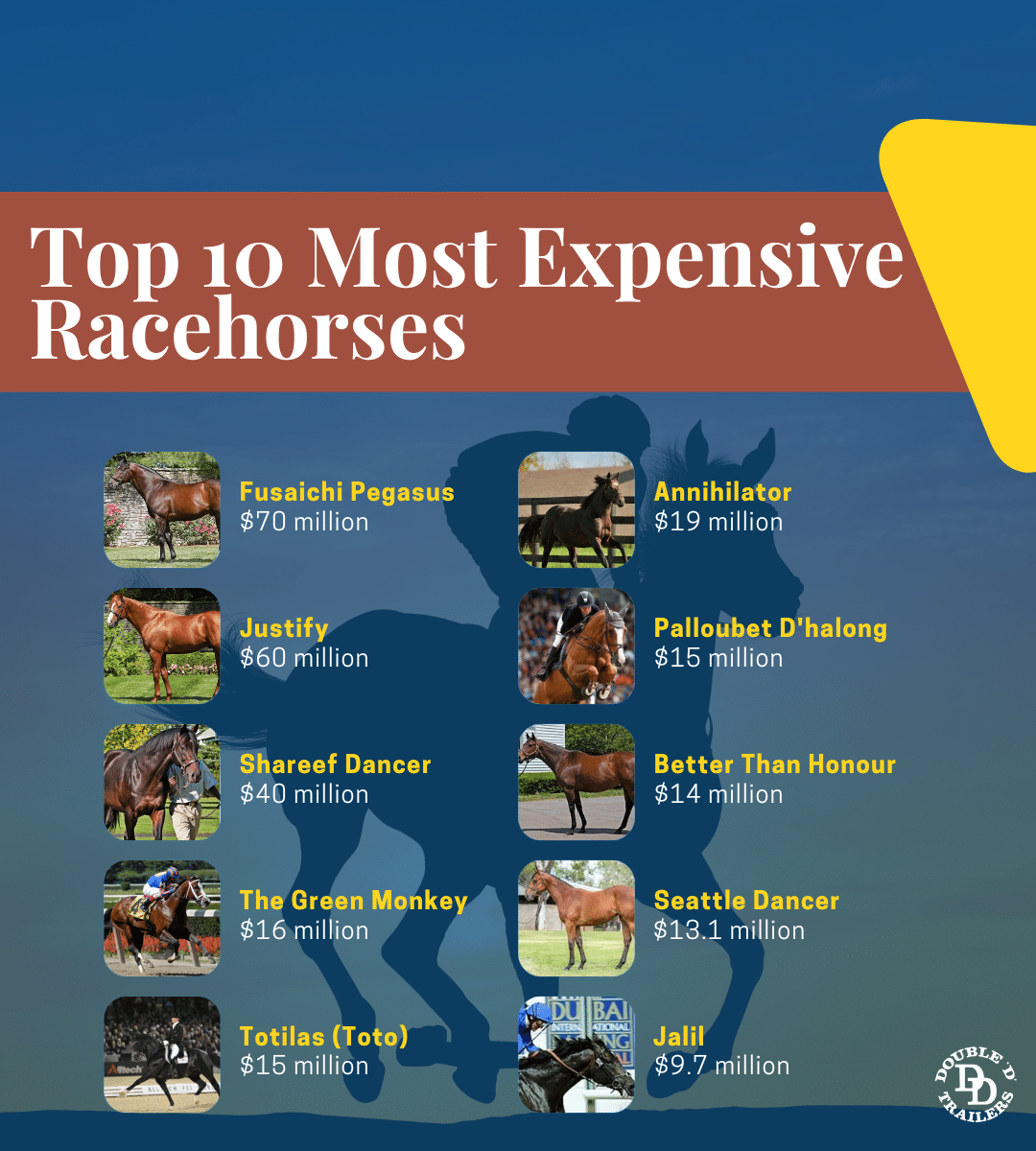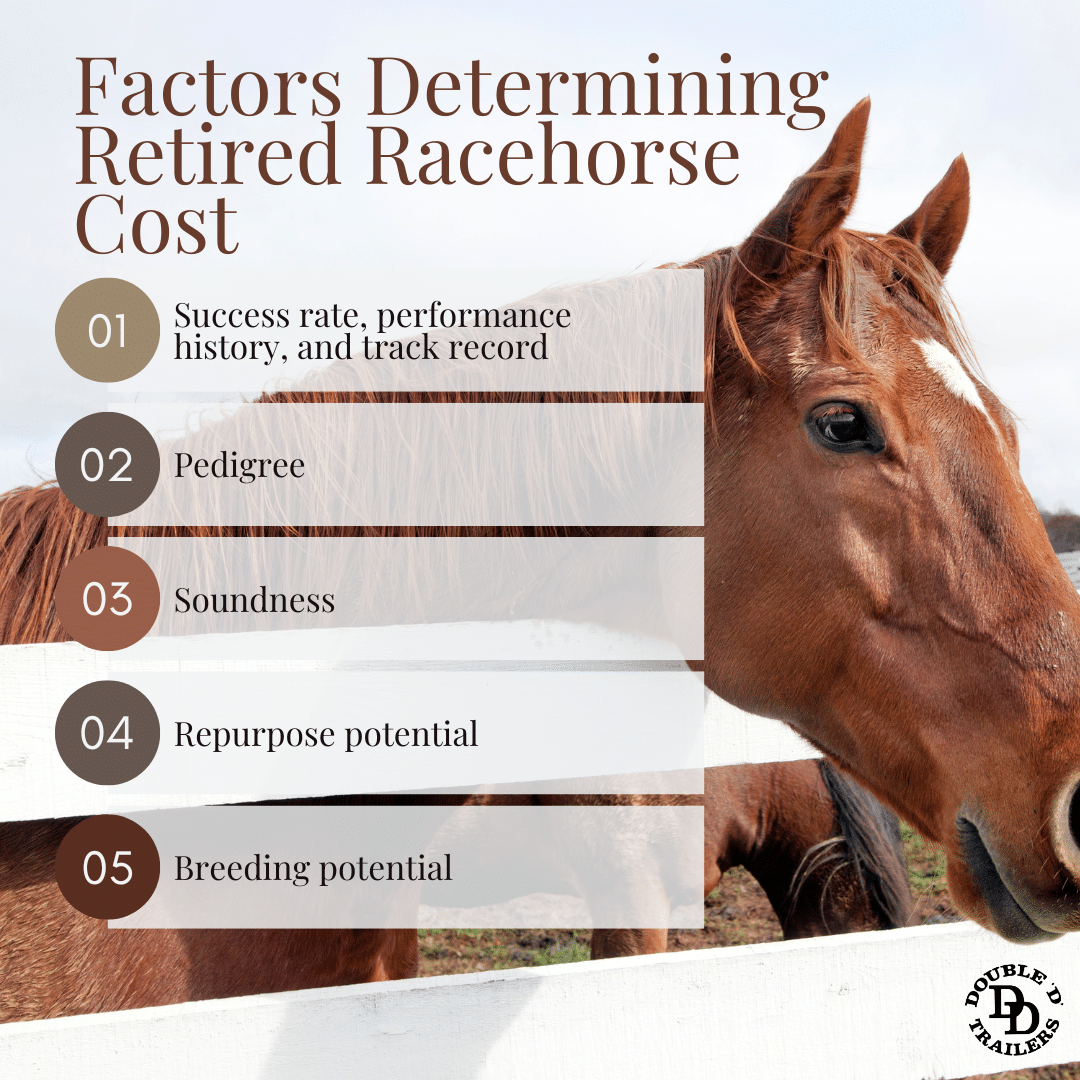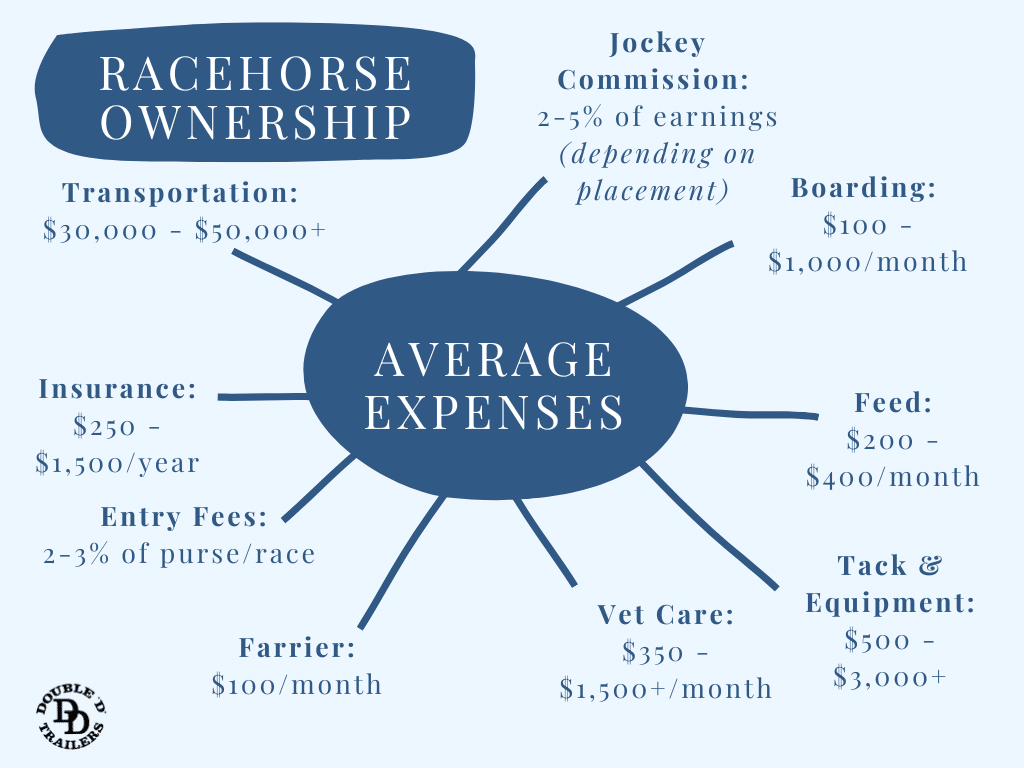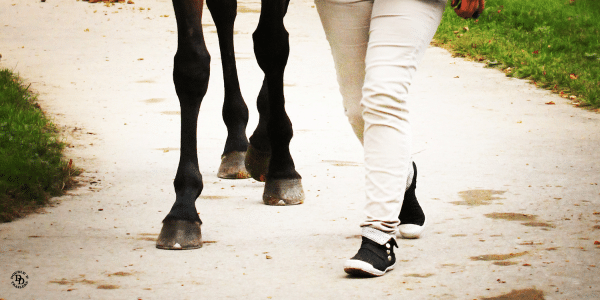Thoroughbred Race Horse Cost: Buying, Owning, and Training Expenses
What Determines Thoroughbred Racehorse Prices?
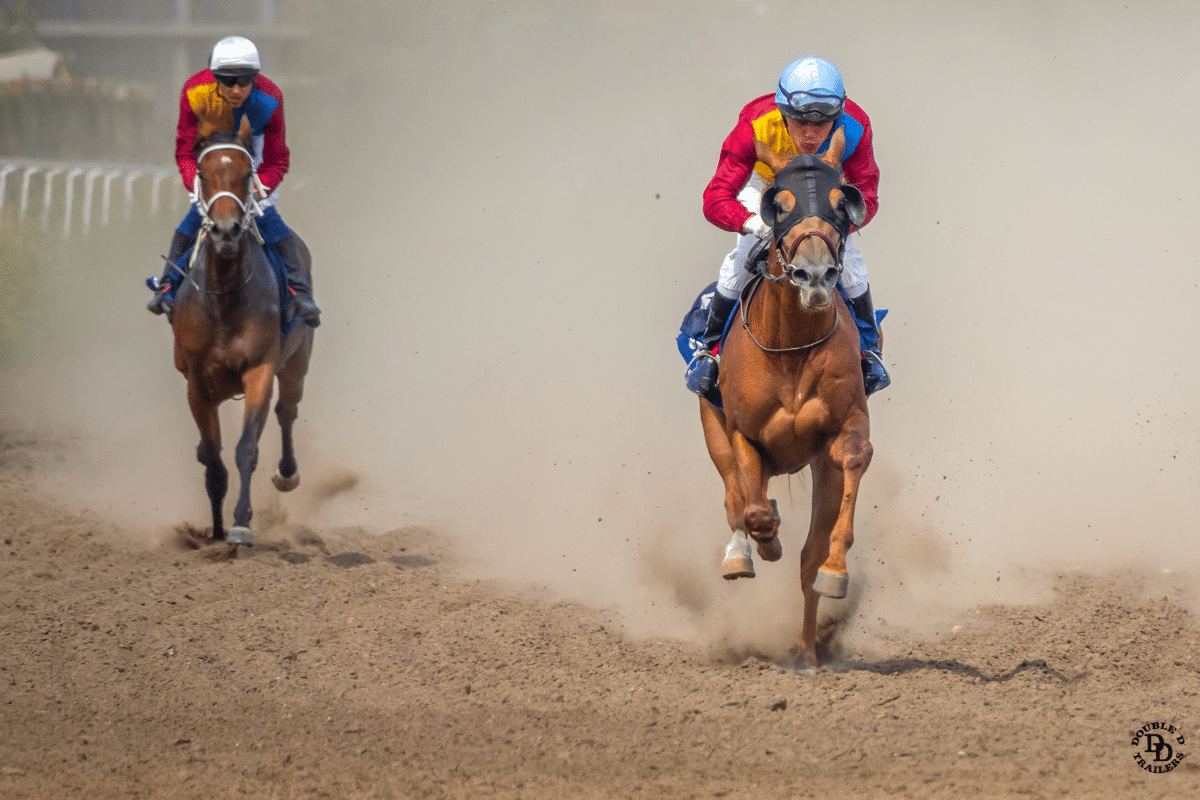 A champion Thoroughbred racehorse costs between $100,000 and $300,000 on average, depending on factors such as pedigree and success rate. The actual Thoroughbred price range is much broader than a champion's average market value. Thoroughbreds can cost a few thousand US dollars but they can also fetch millions. It always comes down to the particular specimen’s traits.
A champion Thoroughbred racehorse costs between $100,000 and $300,000 on average, depending on factors such as pedigree and success rate. The actual Thoroughbred price range is much broader than a champion's average market value. Thoroughbreds can cost a few thousand US dollars but they can also fetch millions. It always comes down to the particular specimen’s traits.
In this section, we’ll discuss the key factors that determine a Thoroughbred racehorse’s price and explain why each particular horse is assessed independently. This individual calculation comprises numerous specifics, hence the wild difference in prices you can stumble upon.
How Much Does a Thoroughbred Racehorse Cost on Average?
When researching prices, consider the important distinction between regular Thoroughbreds and those bred for racing purposes with a relevant pedigree, training, and background. Not all Thoroughbreds are meant to compete or become champions. Therefore, prices can sometimes be a lot less impressive compared to the estimated $100,000-$300,000 average Thoroughbred champion value (as quoted in reputable sources such as the Little Red Feather website).
It’s hard to put a price on a group of Thoroughbreds based on just a few criteria they share. There are too many variables that could have a dramatic effect on a horse’s value. It’s the individual approach that matters the most here. As mentioned in sources such as the JD Supra Knowledge Center’s website, the valuation of a horse involves key factors such as
- Age
- Pedigree
- Physical traits
- Bloodline record
- Racing record and earnings
- Previous evaluations
- Purchase area/location
- Expectations based on consensus
To help you better understand the differences in horse valuation and put things into perspective, we’ll take a look at the price range for different types of racehorses.
What is the Price Range for Different Types of Racehorses?
With various price points related to evaluating racehorses, one must differentiate the types of racehorses and then explore their average prices to get the full picture, which is what we’ll do in this section.
How Much Does a Winning Racehorse Cost?
A winning racehorse costs between $20,000 and $200,000 (sometimes even more). When it comes to trained racehorses in general, the average price typically varies between $50,000 and $100,000. Proven winners can exceed the upper limits by far, though: their prices can soar in the seven or eight-figure range.
The ten most expensive horses of all time were all sold for upward of $10 million U.S. dollars. The record breaker, Fusaichi Pegasus, fetched a whopping $70 million after a successful winning spree, including a Kentucky Derby win in 2000. His legacy continued thanks to his many Grade 1 offspring, too. But that’s not even close to the most highly-valued racehorse of all time: the value of the undefeated champion Flightline was a mind-bending $184 million after a 2.5% share of the horse’s ownership was sold for $4.6 million in 2022.
Of course, 8-figure prices are reserved only for a handful of champion racehorses such as Triple Crown winners with plenty of other significant achievements. Nevertheless, horses with successful racing careers command significantly higher prices than usual. Grade 1 and Grade 2 winners typically sell for close to $1 million or even more, while Grade 3 winners’ prices range between $300,000 and $500,000.
How Much is a Retired Racehorse?
A retired racehorse costs anywhere between $1,500 and north of a million dollars, sometimes even more. An average “off-the-track-Thoroughbred” (OTTB) can sell for $2,500-$4,500, given there’s not much of a winning background related. Needless to say, retired racehorses are far more affordable than actively competing ones, at least in the majority of cases.
The surprisingly wide range in retired racehorses’ prices results from the specific and sometimes tricky combination of factors to be considered, including
- Success rate, performance history, and track record: This is a key factor, as it determines the horse’s competitive level that could potentially influence its offspring
- Pedigree: Racehorses, even the retired ones, can be worth a lot of money if they come from the right family tree, as long as it can be proven
- Soundness: Even horses of respectful age could still be in peak physical form, which greatly increases their prices and may be the most important criterion to consider during a pending sale
- Repurpose potential: If the horse is still at an appropriate age, his days off the track can be far from over. After retirement, many ex-racehorses participate in various activities like dressage, recreational practices, jumping contests, or amusement riding
- Breeding potential: Retired champion racehorses can bring breeding fees of $75,000 or more, given they have the pedigree and achievements to show for such rates
Other factors that significantly influence the price of a retired racehorse include current market demand (people looking for the right horse at the right time), type of deal (auctions sometimes bring the best results compared to private sales), and more.
Sometimes, equestrians rescue or adopt retired racehorses with the help of different institutions and organizations such as The Retired Racehorse Project aiming to help people care for these animals and provide them with the attention they need. The fees and prices related to this scenario are often symbolic, as the main goal is not profit but merely finding the right home for horses who are no longer fit for the racetrack.
How Much Does Pedigree Affect Thoroughbred Horse Prices?
Pedigree is a major factor affecting thoroughbred horse prices, although it’s not the only one. We already discussed some of the other major considerations related to racehorse price estimation. Pedigree affects thoroughbred horse prices because it more or less determines the key traits of a champion, considering the accomplishments and advantages of other horses in the bloodline. Still, lower-pedigree horses can sometimes outperform higher-pedigree ones.
The physical strength and form, training abilities, agility, speed, and endurance of a Thoroughbred horse can be predicted or at least expected based on what the particular horse has been bred to. Provided that a Thoroughbred horse has a proven family tree.
To officially confirm the price of a Thoroughbred based mostly on its bloodline, the racehorse in question should be old enough for a proper evaluation of the qualities and perks it should bear, being a descendent of a particular family tree.
Another way to confirm a racehorse’s potential is to verify it comes from the bloodline of a proven sire or a dam. Proven dams and sires are the ones who have already had appraised offspring of proper age that confirm they can continue that specific bloodline by carrying the functional traits expected.
In the world of Thoroughbred racehorses, there are several notable names that come to mind when you think about legendary sires with a long line of descendants. Into Mischief is on top of that list for sure. His offspring’s earnings are estimated at more than $35 million. Into Mischief has sired numerous Grade 1 competitors.
Why are Some Thoroughbred Racehorses More Expensive Than Others?
Some Thoroughbred racehorses are far more expensive than others simply because they boast the right combination of factors, most of which we already discussed above. To determine the value of a Thoroughbred, professionals always start with the horse’s physical traits - both inherited and acquired as the result of specific, perfectly timed, proper training. This is the foundation for any competing horse’s successful career.
While the genetic potential of a Thoroughbred based on the family tree affects both performance and price, extensive training carried out by top-tier trainers is what turns a promising racehorse into an undefeated champion, and bumps up his value in the process.
The result of combining potential with preparation can be seen in the early days of a racehorse’s career. Even without major achievements on the racetrack, the extremely high probability of a horse becoming exceptionally successful in the years to come can increase his value to the point where he’s more expensive than rivals who have already scored some wins at a similarly early stage of their development.
Not even the most experienced professionals could predict the market trends in some cases. The value of a racehorse largely depends on location and demand as well, meaning that an actively competing Thoroughbred can be more expensive than other seemingly equally matched racehorses just because it has a specific trait that’s in demand, for example.
What is the Price of Black Thoroughbred Horses?
The price of a Black Thoroughbred horse is most often somewhere between $5,000 and $500,000, depending on the same factors listed in the previous article sections. Since Black Thoroughbreds are more uncommon than say chestnut or gray ones, their prices are understandably higher.
To determine the exact price of a Black Thoroughbred racehorse, you need to examine which category it falls into:
- Yearling/Weanling: A specimen who’s still untrained but shows potential can be worth $50,000 or more but it could also be priced much lower
- Racehorses Still in Training: 2-year-old Black Thoroughbreds from elite bloodlines who show plenty of potential can be worth less than $50,000 but could also surpass the $500,000 mark
- Active Competitors: Proven Black Thoroughbred champions can easily fetch seven figures
- Retired Racehorses: A retired Black Thoroughbred can be used for alternative competitions or recreational activities and can still be worth north of $15,000 depending on soundness and pedigree
- Stallions: Black Thoroughbreds used for breeding can easily sell for more than $100,000, with some examples worth millions. It all depends on achievements and bloodline, among other traits
What is the Price of Arabian Thoroughbred Horses?
The price of an Arabian Thoroughbred horse is between $5,000 and $30,000 on average. When we’re talking about a proven champion or a descendant of a strong bloodline with plenty of breeding potential, prices can reach $80,000-$100,000 and above. Still, prices vary depending on the intended use:
- Arabian Thoroughbreds for Pleasure Riding, Shows, or Light Competition: Most Arabians suitable for recreational or pleasure riding, local shows, or light competition can sell for $5,000–$30,000. Such horses most often boast good, proven pedigrees and have undergone training from a proper age. Those with show records typically sell for significantly more money.
- Arabian Thoroughbreds for Breeding Purposes: Arabian Thoroughbred horses with successful bloodlines or high breeding potential can be worth more than $80,000. This category mostly falls in the $30,000–$80,000 range.
How Much Does it Cost to Own a Thoroughbred Racehorse?
The cost of owning a Thoroughbred is approximately $45,000 per year for a champion racehorse. This might seem steep but, considering the prices of such horses can exceed half a million US dollars, it starts to make sense.
Buying the horse is one thing but keeping track of the costs related to maintenance is often the true epitome of financial commitment if you consider such as deal to be an investment (it most often is). To estimate the average yearly costs of ownership for racehorses, it’s best to choose the individual approach and calculate the expenses for the particular case. It’s easier to calculate the monthly expenses for a racehorse when you know the agenda and the daily activities involved.
What are the Monthly Expenses for a Racehorse?
The monthly expenses for a racehorse are more than what some equestrians might think of. Maintaining a racehorse in peak physical condition and excellent competitive form requires a plethora of tasks. We’ll go through the main ones and we’ll mention the estimated costs per month for each item on the list.
- Boarding: When the private stable option isn’t available, a training facility would remain the best solution. Still, boarding costs a lot: the monthly rates can vary between $100 and $1,000, depending on the engagement, the daily schedule and activities included, and the location. Boarding can be full-care, partial, pasture, and self-care.
- Feed: The cost of hay, grain, straw, and supplements should never be neglected when you have to calculate the monthly expenses related to owning a racehorse. The average cost per month combined is $200-$400.
- Veterinary Care: The need for regular examinations, checkups, vaccinations, and emergency care means that vet bills can become a significant chunk of a racehorse’s monthly expenses. The need for a trusted vet, a dentist, and a chiropractor can be as little as $350 per month and surpass $1,500, depending on the volume of care (occasional, moderate, or frequent visits and interventions) and supplies needed, the area, etc.
- Farrier: Regular hoof care and shoeing can also cost a lot, even if it’s a seemingly neglectable expense. A blacksmith can cost up to $100 per month on average, depending on how often you prefer to re-shod the horse (the typical interval is 2-4 weeks).
How Much Does it Cost to Train a Racehorse?
It costs between $50 and $120 per day to train a racehorse, depending on the trainer’s experience and the track (small local tracks are more affordable and easily accessible compared to major venues. Top-tier trainers who have a proven track record of working with champion racehorses charge upwards of $100 per session. Additional costs may apply if you need to cover the trainer’s transportation and lodging costs, given you don’t have the option or don’t prefer to hire a local one.
What are the Other Costs of Owning a Thoroughbred?
The other costs of owning a Thoroughbred include various administrative expenses and fees, transportation, insurance, commissions, entry fees, accounting, and miscellaneous additional payments.
- Insurance: This is an important part of owning a horse. The cost of a Thoroughbred racehorse’s insurance depends on the coverage, premium, type of use, price, and other factors. Insurance can cover mortality, emergency surgery, theft, road transport injuries, and other events. The annual cost can be as little as $250 per year but it can easily exceed $1,500. The premium is typically around 5% of the horse’s value
- Transportation: Transportation is an important factor for all racehorse owners and trainers. It should be planned and carried out with horses’ safety and comfort as the main priorities, meaning that no expense should be spared. A key component of proper horse transportation is the high-quality horse trailer. Properly built bumper pull and gooseneck horse trailers enhance horses’ well-being during transport by providing them with spacious, well-ventilated, insulated, and illuminated stalls. The transportation costs depend on whether a professional company will be used or the horses’ owner is willing to purchase a trailer. Quality horse trailers for two or three horses can cost between $30,000 and $50,000, sometimes even more.
- Tack and Equipment: The cost of saddles, bridles, blankets, and other gear necessary for horse competitions can be a significant part of the total horse ownership expenses calculation. A quality saddle can cost between $500 and $3,000+, and a racing bridle can set you back approximately $500. Saddle pads and girth range from $150 to $800 combined.
- Entry Fees: This is another common and frequent expense that should be added to the cost of owning a racehorse although it sometimes gets neglected. In most cases, the entry fee is 2%-3% of the purse.
- Jockey Commissions: In most cases, the jockey gets around 10% of the proceeds in case of a win. Second and third place are usually awarded with a 5% fee.
How Much Does Racehorse Ownership Cost Through a Syndicate?
The cost of racehorse ownership through a syndicate can vary depending on the share you have and the terms and conditions applicable. It could range between a few hundred and hundreds of thousands of US dollars.
The good thing about this form of ownership is that syndicate members not only share the purchase price of horses but also split the recurring expenses related to maintenance and ownership, such as training, healthcare, entry fees, and so forth. Key advantages of a horse owners’ syndicate include:
- Affordability: Quite often, the purchase price is way beyond the reach of someone who wants to acquire a racehorse. Thanks to syndicate shares, horse ownership is available to a much wider target group
- Less Risk: When the responsibility and cost of ownership are shared, so is the risk. There are plenty of risks involved in owning a racehorse, such as health issues, poor performance, injuries, and more
- Community Role: As part of a syndicate, members not only share the costs and benefits of ownership but also participate in a specific community that creates a special bond between them
- Proper Management: All larger syndicates rely on experienced managers who have plenty of experience in horse management, including transport, care, communications, scheduling, training, and more. This allows syndicate members to enjoy the perks of ownership without the hustle and bustle involved
Is Owning a Racehorse a Profitable Investment?
Yes, owning a racehorse is a profitable investment, at least it can be, as long as you play your cards right. To be a worthwhile investment, acquiring and taking care of a racehorse needs to be planned in advance.
You should consider the sometimes extreme purchase prices, the high maintenance costs, the possible hiccups, and other factors. If your timing is right and you have a good understanding of how the world of horse racing works, you already have an edge. To keep risk within reasonable limits, becoming a member of a syndicate and sharing the costs (and profits) of owning and maintaining a racehorse is a good idea.
How Do Racehorse Owners Make Money?
Racehorse owners can choose between several income sources, depending on their goals. Some choose to acquire racehorses for competition purposes while others prefer to collect stud fees or invest in horses to sell them when demand (and prices) are higher.
- Purse Money: Most racehorse owners actively participate in various events, hoping to either win or at least grab a chunk of the purse money by qualifying among the top 5. The winner usually gets more than half of the purse (60% go to the race winner in most cases). The runner-up usually receives 20%, and the third overall gets 10%. Considering that some of the biggest tournaments boast 8-figure purses, these wins could equal massive gains for racehorse owners
- Breeding: Stud fees can be a very rewarding way of making money for horse owners whose racehorses have retired from competing. A former racehorse in great shape coming from a proven bloodline of champions can bring stud fees as high as $25,000. Mare owners can also make tens of thousands of dollars by selling foals with a high potential of becoming champions, based on their pedigree
- Sales: Selling a racehorse for profit is always a part of the equation. Some owners sell racehorses in their prime or their career peak, thus receiving the highest prices possible. Others prefer to do this after retirement. It’s all a matter of strategy and purpose, and then there’s always market demand which changes constantly.
None of these income sources are guaranteed to bring the desired financial result, as there are too many risks involved, such as low market demand, injuries, unsatisfying race results, and other factors that could turn a potential investment into a loss.
Where Can You Buy a Thoroughbred Racehorse?
If you want to buy a Thoroughbred racehorse, you have three main options to choose from, depending on your situation, location, and preferences.
- Auction: Engaging in auctions gives you the chance to pick one of dozens of horses. It’s an intense way to buy a racehorse, and it’s also a risky one but that’s where the beauty lies - you might be lucky enough to acquire the horse you want for less than expected, even after paying auction fees and taxes. Sticking to a preliminary set budget is the best tactic to avoid overspending.
- Private Sale: Racehorse owners and breeders sometimes sell their horses in private deals. This gives room for negotiations which brings a calmer manner to the transaction when compared to auctions. Plus, you don’t have to pay additional fees.
- Claiming Race: Interested parties can purchase a horse before a claiming race starts by placing a claim (which is nothing other than a purchase bid). The buyer can’t own the horse prior to the race, though. After the race, the original owner keeps the amounts won, and the one who claimed the horse before the start becomes the new owner. It’s a risky deal because even if the horse sustains injuries during the race, the claim remains valid.
What are the Challenges of Racehorse Ownership?
The challenges of racehorse ownership are:
- Financial risks
- High costs
- Uncertainty
- Injuries
- Emotional and physical commitment
Financial risks are part of racehorse ownership, just like with any other investment. Underperforming and unforeseen circumstances can disrupt a horse owner’s financial plan, leading to potentially low profit or a loss.
The high cost of ownership starts with the purchase price. Elite racehorses can cost seven, eight, or even nine figures but that’s just the start of it. As discussed earlier, the ongoing expenses related to owning racehorses are $45,000 on average but that estimate could be far bigger.
The considerable uncertainty in this industry can be a true challenge. The trends, market demands, racing rules, and other factors could vary, thus affecting investing in racehorses in unpredictable ways.
There’s also a risk of injuries that would equal substantial losses for any horse owner. While some could pause a horse’s racing career for a short period, others could be severe enough to end it in an instant, which could lead to losing millions of dollars in some cases.
Many horse owners underestimate just how committed to this industry they must be to persevere. The physical and emotional stress they experience is related to unpredictable and poor performance, negotiations, covering various expenses, analyzing the competition, worrying about the horse, spending time to care about the horse’s wellbeing, logistics, and more.
Frequently Asked Questions (FAQs) About Thoroughbred Racehorses
Is it Difficult to Ride a Thoroughbred?
Yes, a beginner can ride a Thoroughbred, especially if the horse is well-trained and the rider understands the basics and has the proper gear needed.
What is Involved in Thoroughbred Aftercare?
Providing care, additional training, and finding new homes for Thoroughbred horses who are no longer actively competing is known as aftercare.
How is Thoroughbred Horse Racing Regulated?
Thoroughbred racing is regulated by governing bodies such as regulatory agencies and commissions to ensure and control horses’ welfare, alongside racing integrity, licensing, rules, and fairness.

